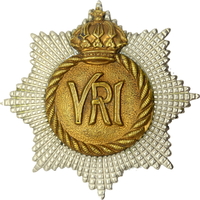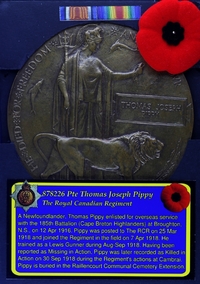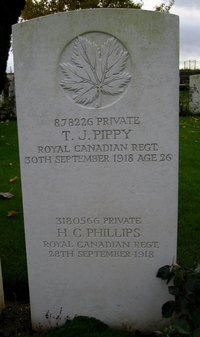
878226 Private Thomas Joseph Pippy
185th Overseas Battalion
The Royal Canadian Regiment
By: Capt (ret'd) Michael M. O'Leary, CD, The RCR
Thomas Joseph Pippy was born in St. John's Newfoundland, on 15 Apr 1891. He was the third child and second son born to parents Henry (Harry) and Fannie Elizabeth (nee Tapson) Pippy. Genealogical records from St John's, cross-referenced with later census data, show that Thomas' siblings were George (b. 1877), Eliza (Lillie) (b. 1878), twins Ethel and Laura (b. Feb 1895 and tragically died the following month, 12 days apart), and youngest sister Ethel (b. 1896).
In the Digital Archives Initiative published online by the Memorial University of Newfoundland, father Henry Pippy can be found in city directories for St John's. His name appears in available volumes for 1885-6, 1890, 1897, and 1898. With four different home addresses in the four appearances, he is identified as a ship's carpenter or shipwright in each case.
By the time of the 1901 Canadian census, the Pippy family has moved from Newfoundland and settled in North Sydney, Cape Breton, Nova Scotia. With not unexpected inconsistencies in the recording and transcription of names, the family appears in both 1901 and 1911 censuses. By 1911, Henry (61) and Frances (Fannie, 52), still have three children living at home: Eliza (27), Thomas (20), and Ethel (15). In the 1911 census, Fannie is shown as the head of the household in the census.
Thomas Pippy attested for service in the Canadian Expeditionary Force (C.E.F.) with the 185th Overseas Battalion at Broughton, N.S., on 12 Apr 1916. A 25-year-old clerk, Pippy was described on his attestation paper as 5 feet 8 inches tall, weighing 144 pounds, with a 38-inch chest, a ruddy complexion, blue eyes, and brown hair. His religious denomination was Presbyterian. Pippy identified his mother, Fannie Pippy, Summer St., North Sydney, N.S., as his next of kin. On attesting with the 185th Battalion, Pippy was given the service number 878226.
The 185th (Cape Breton Highlanders) Battalion, C.E.F., was authorized on 15 Jul 1916. Based in Broughton, N.S., the unit recruited throughout Cape Breton Island and embarked for Great Britain on 13 Oct 1916. The 185th Bn. provided reinforcements for the Canadian Corps in the field until 15 Feb 1918, when its remaining troops were absorbed by the 17th Reserve Battalion.
In June, 1916, while he was training with the 185th Bn., Pippy forfeited two days' pay. The size of the punishment indicates a relatively minor military crime, possibly an absence of two days for which he lost the pay he would have earned.
Pippy completed a military will form on 23 Aug 1916. On this document, he declared that in the event of his death, all his real and personal estate would be left to his mother, Mrs. Francis Marrie Pippy (sic).
Commencing October, 1916, Pippy established a monthly Pay Assignment of $20 to be sent to his mother. As a Private in the C.E.F., Pippy was paid $1.00 per day plus an additional ten cents daily field allowance. His pay assignment represented about two-thirds of his monthly pay.
The 185th Battalion, with Pippy in its ranks, embarked at Halifax N.S., on 13 Oct 1916. The battalions would cross the Atlantic aboard the S.S. Olympic. The White Star line troopship, sister ship to the Titanic, would disembark the troops at Liverpool, England, on 18 Oct 1916.
On 1 Nov 1916, Fannie Pippy began receiving Separation Allowance from the Militia department. The first payment, for $172, indicates that the start of entitlement to the allowance was seven months earlier. This likely shows that Pippy had claimed to be the principal support of his dependent parents at the time of his enlistment and that was now recognized. Fannie would continue to receive $20 per month separation allowance.
After little more than two weeks in England, Pippy was admitted the camp hospital at Aldershot on 4 Nov 1916. Two days later, he was admitted to Connaught Hospital, Aldershot. Pippy's diagnosis was initially recorded as "N.Y.D." (i.e., not yet diagnosed), but was later recorded as "V.D.G." (venereal disease, gonorrhea). Located at the Marlborough Lines, Aldershot Garrison in Hampshire, Connaught Military Hospital was a 1100-bed facility with a large specialist unit for venereal, mental, and prisoner cases in addition to its wards of general medical beds. Three weeks after his admission, Pippy was discharged from hospital on 25 Nov 1916.
On 5 Feb 1917, Pippy was appointed Acting Lance Corporal (without pay) while on command, i.e., a temporary duty assignment without changing parent units. His service record does not specify the "on command" assignment, but on 18 May 1917, Pippy reverted to the permanent grade of Private at his own request.
A month later, on 20 Jun 1917, Pippy was again appointed Acting Lance Corporal without pay. He remained at this rank until 1 Dec 1917, when he began to receive the pay for his appointment. Three months later, on 23 Feb 1918, Pippy again reverted to Private at own request. This reversion was in concert with a transfer to the 17th Reserve Battalion.
Pippy remained with the 17th Battalion for only one month. On 25 Mar 1918, he was struck off the strength on proceeding overseas (i.e, across the Channel) to The Royal Canadian Regiment. Pippy landed in France on and was tekn on the strength of The RCR on arrival at No. 3 Canadian Infantry Depot Battalion (C.I.D.B.). Five days later he left 3 C.I.D.B. for the Canadian Corps Reinforcement Camp (C.C.R.C.) and on 7 Apr 1918, Pippy joined The RCR in the field.
Front line trenches, support trenches, reserves, marching, and training were the perpetual cycle of the infantry battalion on the Western Front. Few tours of the front lines were without casualties, and even when out of the most forward trenches, the reach of enemy artillery could take its toll.
On the day Pippy joined the Regiment at the front, The RCR were coming out of the forward trenches in the Lens sector after a 6-day tour and moving into Brigade Reserve. On 13 Apr 1918, the Regiment returned to the front line trenches at Lens, this time for a long tour that lasted until 1 May 1918.
From 1 May to 26 Jun the Regiment changed location five times, and spent three separate periods in training: 3-6 May at Cambligneau, 8-9 May at Lieres, and 11 May to 24 Jun at Bourecq.
On 27 Jun 1918, The RCR went into Brigade Reserve south of Arras at Wailly and the next day took over a new part of the line at Neuville Vitasse. After an 8-day tour of the forward trenches, the Regiment went into Divisional Reserve on 7 Jul 1918 and then to Local Support trenches from 14 to 25 Jul 1918.
After another short period of training from 3-5 Aug 1918, The RCR returned to the front lines on 8 Aug 1918 with participation in an attack on German positions. Within two and one-half hours after leaving their jumping off trenches, the leading companies of the Regiment reported that they had reached their objectives. The narrative of operations for the day in the War Diary reports the Regiment captured six field guns, 14 machine guns and 160 prisoners at a cost of 34 casualties.
On 9 Aug 1918, The RCR moved into Divisional Resere and on 11 Aug 1918 into Local Support positions. From there, on 12 Aug 1918, Pippy was sent On Command to attend a Lewis Gun course at the Canadian Corps School. He returned from course on 9 Sep 1918 while the Regiment was in Brigade Reserve.
Following a transition to Divisional Reserve 12-18 Sep), a move to Berneville for a period of training (2025 SeP) and another move to Queant, The RCR was prepared to rejoin the front line battle. The Regiment's "Battle Bar Document" (prepared after the war by the Militia Department in anticipation of the possibility of clasps for the British War Medal) summarizes the actions of the next few days:
"28 Sep 1918 – 5.30 a.m., Advanced to the attack on the MARCOING LINE and after severe fighting the line was established in vicinity of ARRAS-CAMBRAI ROAD in F.6.a. & c. Sheet 57.C. NE.
"29 Sep 1918 – Bn in Reserve in F.6.a. & c.
"30 Sep 1918 – Assembled at 5.30 a.m. in S.19.central. Sheet 51.A.
6 a.m. – Bn attacked positions NORTH of TILLOY. heavy resistance was met with and Bn compelled to dig in in S.20.b. and S.21.a. Sheet 51.A. vicinity of TILLOY-BRECOURT ROAD.
"1 Oct 1918 – 9th Bde passed through the Bn's positions and Bn moved back to QUARRY WOOD.
When The RCR withdrew from the field of battle on 1 Oct 1918, Thomas Pippy was not in the ranks. The 28th and 30th of September cost the unit dearly. The War Dairy noted the following immediately known loses: Officers: 3 killed, 1 died of wounds, 16 wounded; Other ranks: 51 killed, 1 died of wounds, 185 wounded, 53 missing, and 3 wounded, at duty.
In the accounting of the Regiment's losses, Pippy was reported missing after action on 30 Sep 1918. This was later changed to "Previously reported missing now reported Killed in Action."
Three weeks after his disappearance on the battlefield, Pippy's family received word of his fate. Two cable s were sent to the family home in North Sydney. The first cable, on 21 Oct 1918, read: "Reported missing [after action] Sept. 30th, 1918." The second cable came four days later on 25 Oct 1918. It read "Previously reported missing, now reported Killed in Action, Sept. 30th, 1918."
Pippy's body was recovered from the field. He was buried in Raillencourt Communal Cemetery Extension, Nord, France. The Commonwealth War Graves Commission register for the cemetery has an entry for him, it reads:
"PIPPY, Pte. Thomas J., 878226. Royal Canadian Regt. 30th Sept. 1918. Age 26. Son of Hanry and Frances M. Pippy, of North Sydney, Cape Breton, Nova Scotia. I. C. 18."
At Raillencourt, Thomas Pippy lies in a shared grave and there are two names on the headstone. With him is 3180566 Pte. Herbert Cecil Phillips (The RCR) of Clark's Harbour, N.S., who died 28 Sep 1918.
For his service, Pippy was entitled to a War Service Gratuity of $180. This amount, decreased by $20 to reimbursed a pay assignment sent to them after Pippy's death, was paid to his parents by a cheque issued 13 Aug 1920.
For his service in the C.E.F., Pippy was awarded the British War Medal and the Victory Medal. These were despatched to his parents in North Sydney on 15 Nov 1921. The Pippys would also receive the Memorial Plaque and Scroll and a silver Memorial Cross was sent to Fannie Pippy.
Pro Patria
Visit a randomly selected page in The O'Leary Collection (or reload for another choice):
- The O'Leary Collection; Medals of The Royal Canadian Regiment.
- Researching Canadian Soldiers of the First World War
- Researching The Royal Canadian Regiment
- The RCR in the First World War
- Badges of The RCR
- The Senior Subaltern
- The Minute Book (blog)
- Rogue Papers
- Tactical Primers
- The Regimental Library
- Battle Honours
- Perpetuation of the CEF
- A Miscellany
- Quotes
- The Frontenac Times
- Site Map
QUICK LINKS
The O'Leary Collection—Medals of The Royal Canadian Regiment
Newest additions:
![]()
![]() SB-12725 Private Henry "Hank" Ard
SB-12725 Private Henry "Hank" Ard ![]()
WIA at Hill 187, Died of Wounds in Japan
![]()
![]() 2355331 Lance Corporal Albert Lorking
2355331 Lance Corporal Albert Lorking
Wounded in action, later a War Amps representative.
![]()
![]() 4334 / 477996 Pte Isaac Hamilton Wilcox
4334 / 477996 Pte Isaac Hamilton Wilcox
Permanent Force, South Africa, and C.E.F.
![]()
![]() 477019 Private Harold Ashcroft
477019 Private Harold Ashcroft
Transferred to the Tunnelers.
![]()
![]() 734231 Private Clark D. Thompson
734231 Private Clark D. Thompson ![]()
The older Thompson brother, killed in action.
![]()
![]() 733849 Private Norman Parker Thompson
733849 Private Norman Parker Thompson
The younger Thompson brother; post-war service in the Special Guard.
![]()
![]()
![]() A305 / 400305 Private Andrew Walker
A305 / 400305 Private Andrew Walker ![]()
"Previously reported Wounded, now Killed in Action."
![]()
![]() 823298 Pte Thomas Patrick Steele, M.M.
823298 Pte Thomas Patrick Steele, M.M. ![]()
… for gallant conduct in the field …
![]()
![]() P13066 Sergeant Harold Thompson
P13066 Sergeant Harold Thompson
Instrumental Soloist for over 20 years of Canadian Army service.
![]()
![]() 9609 / 477728 Private Albert Edward Piper
9609 / 477728 Private Albert Edward Piper
"Arrived from England as a STOWAWAY …"




